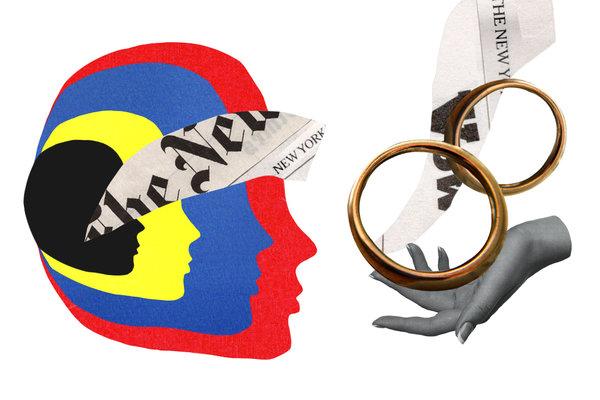
CreditFranziska Barczyk
Gender Letter helps you keep up with the world, and the women shaping it. Tell me what you think at dearmaya@nytimes.com.
This year is winding down, readers, and I hope that for you all, Thanksgiving has been a lovefest (or more realistically, low on family drama).
In that spirit, I wanted to take a moment to talk about one of my favorite long-weekend guilty pleasures: reading about other peoples’ weddings.
For many of us, The Times’s Wedding section conjures scenes from “Sex and the City,” when Carrie and the gang gather to hate-read tales of Manhattan upper-crusters in love over Sunday brunch.
I asked LeAnn Wilcox, the Times weddings editor — and a former a copy editor on the sports desk, among others — how Weddings has changed since she took over as editor two years ago… and to debunk some of the persistent myths about her job.
CreditLawrence Jackson for The New York Times
Tell us about some of your favorite Vows.
A recent one was this Wisconsin couple. As high schoolers, she learned she was pregnant after they broke up. The baby was placed for adoption. She moved away. Both married more than once.
They hadn’t talked in decades. They were reconnected when their son began searching for his biological parents. They were suddenly thrown back into their past and fell in love back in that small Wisconsin town. And their son was the officiant at their wedding.
But I have a new favorite Vows all the time: whether poignant (Sam Siatta and Ashley Volk); incredibly hopeful (a Seattle homeless couple); unexpected (a 98- and a 94-year-old who met at the gym); or a fairy tale (a woman meets an Ethiopian prince in a nightclub).
What misconceptions do people have about the Times wedding section that you’d like to dispel for good?
Often people believe that our wedding announcements are paid. They are not. They’re free, and anyone may submit.
[Want to submit? You can do so here. No Ivy-league degree necessary.]
But just because you submit, doesn’t mean you are in. And just because you are chosen doesn’t mean we take your word for everything. These announcements are reported and fact-checked.
How do you decide whom to choose?
I don’t choose couples because they are old-school money, are Harvard and Yale elites, have Mayflower ancestors — though I might choose them. I try my best to have a selection of interesting and diverse people every week in our pages.
Some would argue that having a wedding section at all is pretty retro. Aren’t there more substantive stories we could be telling?
People are interested in other people and their love stories. What’s not to like about love? Weddings, I think, are a guilty pleasure.
I’ll admit, it’s hard to shake the patrician image some people have of our pages, but if they actually read the pages, they might be surprised.
______
What to read (holiday-weekend edition)
-
Tis the season — to say no. Here’s how to turn down holiday obligations without your life exploding in a fiery ball of chaos. [The New York Times]
-
Women are more stressed than men. Domestic duties and emotional labor add up. Here’s what the data says, and how to take care of yourself. [The New York Times]
-
Thanksgiving, debunked. It may be the day after turkey day, but there’s still time to drop some truth bombs. [The New York Times]
-
900 pounds, 70 spikes and three million crystals. No, it’s not a newly discovered planet, it’s what makes up the star that will sit atop this year’s Rockefeller Center Christmas tree. [The New York Times]
-
Latkes, kugel, jelly doughnuts. Here are some of our favorite recipes for Hanukkah, which starts Dec. 2. [The New York Times]
______
From the archives: The first same-sex union in The Times
In 2002, Daniel Andrew Gross and Steven Goldstein made history as the first same-sex couple to (finally) get an announcement in the The New York Times wedding pages.
When Mr. Goldstein got the good news in his email, he “started screaming, ‘Daniel! Daniel! The New York Times has changed its policy!’” he told The Times last year. “‘And we’re going to be the first couple!’”
At that time, only a couple of states allowed for domestic partnership or civil union status. Same-sex marriage was not legal in any state until 2004, when the Massachusetts Supreme Court legalized it.
“Nothing helped the cause of marriage equality more than the stories of same-sex couples falling in love, and having the same joys and challenges as any other couple,” Mr. Goldstein said.
Like this article? Sign up here to get future installments of Gender Letter delivered to your inbox.
Are you on Instagram? Follow us here.







